English around the world优秀版
Unit 2 English around the world-reading-课件 (10)

Elsewhere in Africa and on the Indian subcontinent(次大陆), English is still used as an official language in several countries,even though these countries are independent of British rule.However, English remains very much a second language for most people,used in administration(行政),education and government and as a means of communicating between speakers of different languages.As with most of the Commonwealth(英联邦),British English is the model on which, for instance,Indian English is based.In the Caribbean and especially in Canada,however,historical ties with the UK compete with geographical,cultural and economic (经济的)ties with the USA,so that some aspects (方面)of their English follow British rules and others show US usage.
C
(3)How long did Britain rule India? D A.About 100 years. B.About 50 years. C.About 350 years. D.About 200 years. (4)Who gave American English spelling its own identity? C A.Shakespeare. B.George Washington. C.Noah Webster. D.An English king. (5)Which country may have the largest number of English learners in the world? A A.China.B.Australia. C.India. D.Britain.
高中英语 UNIT 2 English Around the World教案 新人教版必修1
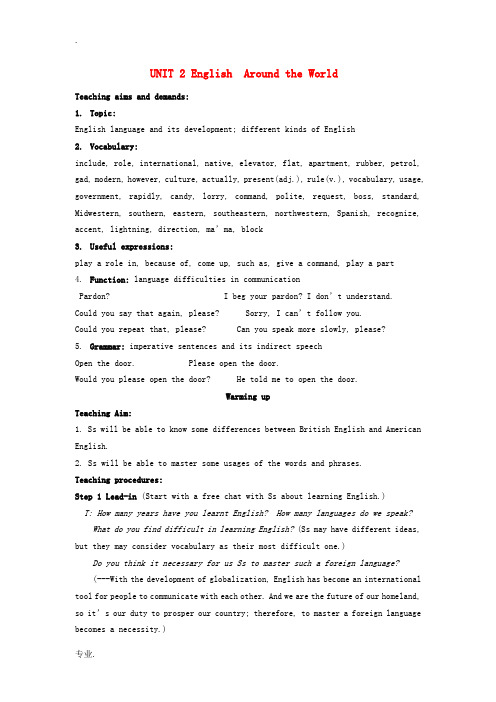
UNIT 2 English Around the WorldTeaching aims and demands:1.Topic:English language and its development; different kinds of English2.Vocabulary:include, role, international, native, elevator, flat, apartment, rubber, petrol, gad, modern, however, culture, actually, present(adj.), rule(v.), vocabulary, usage, government, rapidly, candy, lorry, command, polite, request, boss, standard, Midwestern, southern, eastern, southeastern, northwestern, Spanish, recognize, accent, lightning, direction, ma’ma, blockeful expressions:play a role in, because of, come up, such as, give a command, play a part4.Function: language difficulties in communicationPardon? I beg your pardon? I don’t understand.Could you say that again, please? S orry, I can’t follow you.Could you repeat that, please? Can you speak more slowly, please?5.Grammar: imperative sentences and its indirect speechOpen the door. Please open the door.Would you please open the door? He told me to open the door.Warming upTeaching Aim:1. Ss will be able to know some differences between British English and American English.2. Ss will be able to master some usages of the words and phrases.Teaching procedures:Step 1 Lead-in (Start with a free chat with Ss about learning English.)T: How many years have you learnt English? How many languages do we speak?What do you find difficult in learning English? (Ss may have different ideas, but they may consider vocabulary as their most difficult one.)Do you think it necessary for us Ss to master such a foreign language?(---With the development of globalization, English has become an international tool for people to communicate with each other. And we are the future of our homeland, so it’s our duty to prosper our country; therefore, to master a foreign language becomes a necessity.)In which countries is English used as the native language? Do you think the Englishes spoken all around the world are all the same ?Enjoy BBC and VOAStep 2 discussionActivity 1. Ss discuss in groups about the differences between British English and American English, and give some examples.Activity 2. Ss guess which of the following words is British English and which is American English:apartment/flat bathroom/toilet can/tin candy/sweetcheck/banknote (cheque) elevator/lift fall/autumn game/match line/queue penal /pen friend mad/angry mail/ postmom/mum movie(film)/film pants /trousers repair/mendsick/ill cookie/biscuit crazy/mad drugstore/chemist’s gas/petrolStep 3 warming upT: Now let’s enjoy a dialogue between two foreigners.T: Which language do they speak? Why do they misunderstand each other?(There exist differences between Englishes. The different Englishes make up the world Englishes.)Step 4 discussion1.Do we need to learn both British and American English?2.What kind of English would you like to learn?3.Why?Step 5 appreciationAppreciate the dialogue between Bush and BlairStep6 Homework1. Preview reading2. English weekly3. p11 ex1,2.ReadingTeaching aim:a) Ss will be able to know the development of English and feel the role that culture plays in the change of language. b) Comprehend the whole passagec) Ss will be able to know how to get the key sentence of a paragraph.Teaching procedures:Step 1 lead inAsk students several questions in the form of brain storming.1.Do you know the countries where people speak English? List them on a pieceof paper.2.What are the two main groups of English?3.Do you know the differences between British English and American English?4.Do you know the history of English?Step 2 fast readingEnglish is not only different from country to country, but also different from what it was before. Read the title “the road to modern English〞 and predict (预测) what the passage is mainly about?T: Scan the text to find or make out a key sentence for each paragraph.Let the students find out key sentence of each paragraph or ask them to summarizeStep 3. Intensive readingT: Let’s enjoy the whole passage paragraph by paragraph again. Pay special attention to the following Qs:How did old English develop into modern English?Why does English change all the way?What other Englishes developed from the old English?(1). Give the three major periods of the development of English.the end of the 16th century-------- the next century ------------ todayWho promoted the spread of English?People. When they moved, they carried English to different places.(2) T: Although they speak English, yet sometimes they can not understand each other well, why?--------- Because there exist differences between different Englishes, not only in vocabulary, but also in pronunciation and spelling. (hot/mum/honour/ honor/neighbour/neighor…..)(3) T: How do these differences come about? (Why does English change over time?)--------- Because of cultural communication.Ask ss to find out the characteristics of each time according to the time axis.AD450-1150: German 1150-1500: less like German; more like FrenchIn the 1600’s: Shakespeare’s English The time ADEL was written: American EnglishLater: Australian English(4) T: Besides the countries where English is used as a native language, where else is English used as a foreign language?---------- South Asia, India, South Africa, Singapore, Malaysia and China.Activity 1. fill in the chartActivity 2. Answer the following questions(1)What is the clue of the passage?(2) Why does India have a very number of English speakers?(3) When did people from England begin to move to other parts of the world?Activity 3: Choose the correct answers.Step 4 Post-ReadingT: From the passage we can see English is widely accepted as a native, second or third language. No wonder the number of people learning English in China is increasing rapidly. Will Chinese English become one of the world Englishes? ---------- “ Only time will tell〞.T: How do you understand this sentence?---------- It means that something can only be known in the future.T: What can you infer from this sentence about the development of English in China? --------- It indicates that it remains to be seen just how much the Chinese culture will influence the English language in the present country.Step 5. Language focus:1)even if=even though: in spite of the fact; no matter whether: He likes tohelp us even if he is very busy.2)communicate with: exchange information or conversation with other people:He learnt to use body language to communicate with deaf customers.3)actually=in fact: used when you are adding new information to what you havejust said: We’ve known for years. Actually, since we were babies.4)be based on…:5)make use of: use sth. available6)Only time will tell: to say that something can only be known in the future:Will China’s nati onal football team enter for the next finals of the World Cup? Only time will tell.Step 6 DiscussionWork in groups. Discuss the question and then ask two groups to report their answers to the class.Step 7 Homework1. Read the passage as fluently as you can.2. Find out some words and sentences you think are beautiful and recite them.3. p11.ex2.3.4Vocabulary and Useful ExpressionsWarming up1.They are called world Englishes and they include Canadian, British, American,Australian and Indian.include: v. 包括,包含e.g. The price includes service. 这个价钱包括服务费。
English around the world全单元课件

加拿大英语
澳大利亚英语具有独特的发音和词汇,反映了
加拿大英语是加拿大最主要的官方语言之一,
该国的文化和历史。
包含了一些特殊的语言变体。
英语作为通用语
1
通用语定义
英语作为通用语,有助于不同文化之间
通用语的重要性
2
的交流和理解。
全球商业、科技和学术界都需中的英语
保持多元文化多样性
推广英语的同时,需要面临如何保持文化多样性的挑战。
总结
简要总结了全球英语的关键点,并讨论了未来英语在世界的影响和必要性。
呼吁人们积极推动多语言和文化多样性的发展。
在跨国交流中,英语成为决策者和专业
人士之间的工具语言。
全球化和英语
1
英语与全球化的关系
2
英语的传播
3
英语作为全球语言
全球化的推动促进了英语
英语已经成为世界上最广
英语的普及程度让它成为
在全球范围内的使用和发
泛使用的语言之一,连接
一种全球性语言,影响着
展。
了各个文化和国家。
全球的各个领域。
全球英语教学
不同的教学方法
国家教学方法的差异
英语教学对未来的重要性
全球英语教学有各种不同的方法
不同国家对英语教学采取不同的
为了下一代的成功,英语教育至
和技巧,因地区而异。
方法和重点。
关重要。
全球英语的挑战
单一文化对英语的影响
单一文化对英语的传播和多样性产生了挑战。
英语对本土语言的影响
全球广泛使用的英语对各国本土语言产生了深刻影响。
全球英语 - 英语在世界的
应用
介绍全球英语,包括定义、重要性和应用。全球化进程中的文化多样性和跨
unit2_English_around_the_world教案

unit2_English_around_the_world教案Unit 2 English around the worldPeriod 1Warming Up& Pre-readingTeaching aims: To make Ss to get to know some differences between British English and American English.Important and difficult points: To tell and grasp the differences between British English and American English.Teaching procedures:TO arouse the students’ interest and lead in the topic, the teacher can organize some activities. Step1: T:We have learned something about friendship in unit 1. Do you know what problems they will meet if a British boy wants to make friend with an American boy?Step2. Let Ss discuss how many countries use English as their official language and which countries.(教师可通过PPT的形式,借助以英语为官⽅语⾔的国家国旗和世界地图来辅助完成) And do you know that there is more than one kind of English? Ss may list America, Britain, Canada, Australia……Teacher writes “American English, British English, Canadian English, and Australian English……T: Are the Englishes talked around the world all the same? (先让学⽣⾃由讨论,然后⽼师播放⼀段来⾃不同国家的母语为英语的外国⼈的视频)Step3. Get the Ss to discuss in groups about the differences between American English and British English, and give some examples.a. Can you understand the different kinds of English these people are using?Speaker1: Let’s go to the pictures?Speaker2: Ok. But how shall we go to the movies?Speaker1: Why not go by underground?Speaker2: Er, but the subway station is far away.When you hear two native speakers of English, they may still not speak the same kind of English. Situation discussionJack is a British boy. He went to America for a trip in this summer vacation. The first day he went to a restaurant and looked around for a toilet. When he asked the waitress, she told him it is on the second floor. Jack went up two floors only to find empty rooms.Where is the toilet?BSpeaker1: Can you tell me how to spell the word “neighbor”?Speaker2: N-E-I-G-H-B-O-U-R, neighbour.Summary: Main differencesSpelling, pronunciation and vocabularyPeriod 2Reading and ComprehendingTeaching aims:1、To get students to have a general view about the historical development of English.2、To get students to know different kinds of English around the world, especially the differences between British English and American English.3、To i mprove the students’ reading ability.Important points:1、How to improve the students’ reading ability.2、How to make students enlarge their knowledge on English through reading.Difficult points:1、To be able to get the main idea from the text.2、To be able to use the different reading strategies for different purposes.3、Expressing one’s ideas why one should learn English.Teaching procedures:Step1: Lead-in1. Why should we learn English?Step2SkimmingRead quickly to get the main idea of the text.1. The text mainly tells us ___________.A. that old English is different from the English todayB. how Middle English formedC. English and its historyD. that English will keep changing2. The text is developed mainly by ____.A. placeB. timeC. peopleStep3Scanning【答案】 1.England 2.based 3.German 4.vocabulary5.change /doc/5eed1d4e915f804d2b16c193.html cation9.learners10.identityStep4DiscussionWork in groups. Discuss the following question and then ask two groups to report their answers to the class. 1. Why do you think more people in the world now want to learn Chinese?Period 3 Language pointsTeaching aims: To make Ss to know the meanings of the important words and phrases and master their usages. Important and difficult points:To master the important words and phrases.Teaching procedures:1、the road to modern English常与to连⽤的名词:key, answer, entrance, monument……e. g: the key to the bike, the entrance exam to collegeThere stands a Monument to the People’s Heroes on the hill.2、Do you know that there is more than one kind of English?(P9)你知道英语不⽌⼀种吗?more than的⽤法(1)more than ⽤在数字前,意为“⽐…..多;超过……” 意为“不⽌⼀个”(含义为复数,但谓语动词⽤单数)。
人教版高一Unit2Englisharoundtheworld
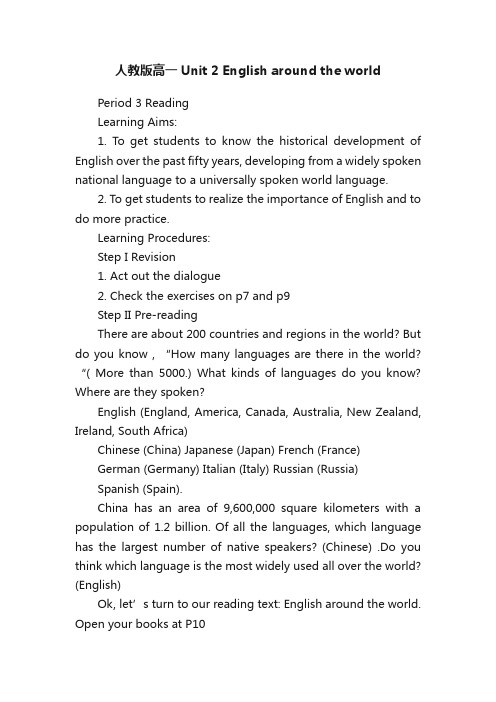
人教版高一Unit 2 English around the worldPeriod 3 ReadingLearning Aims:1. To get students to know the historical development of English over the past fifty years, developing from a widely spoken national language to a universally spoken world language.2. To get students to realize the importance of English and to do more practice.Learning Procedures:Step I Revision1. Act out the dialogue2. Check the exercises on p7 and p9Step II Pre-readingThere are about 200 countries and regions in the world? But do you know , “How many languages are there in the world? “( More than 5000.) What kinds of languages do you know? Where are they spoken?English (England, America, Canada, Australia, New Zealand, Ireland, South Africa)Chinese (China) Japanese (Japan) French (France)German (Germany) Italian (Italy) Russian (Russia)Spanish (Spain).China has an area of 9,600,000 square kilometers with a population of 1.2 billion. Of all the languages, which language has the largest number of native speakers? (Chinese) .Do you think which language is the most widely used all over the world? (English)Ok, let’s turn to our reading text: English around the world. Open your books at P10Step III ReadingListen to the tape and try to find out:1. How many people speak English as a mother tongue?(More than 375 million people)2. How many people speak English as a second language?(More than 375 million people)3. In which countries can we find native speakers of English?The United Kingdom, the United States of America, Canada, Australia, South Africa, Ireland, New Zealand4. From the text we know, in countries such as India, Pakistan, Nigeria, and the Philippines, English is used in a different way. How is English is used there? Please describe the situations in such countries.1. How many people use English as a foreign language? Can you give me an example country.2. But in Hong Kong, the situation there is quite different . How is English used in Hong Kong?7. Why is it becoming more and more important to have a good knowledge of English?(English has developed into the language most widely spoken and used in the world . With more and more people using English around the world in trade/ business, travel/ tourism or international organisations, we need to be able to communicate using the English language.)8. From what we have learned, we know English is a kind of language spoken all over the world.Bb design:Number of speakers Example countriesThe native language More than 375 million The United Kingdom, the United States of America, Canada, Australia, SouthAfrica, Ireland, New ZealandThe second language More than 375 million India, Pakistan, Nigeria, the PhilippinesTheforeign language More than 750 million China….The working language of international organization, international trade and tourism.Step IV Post reading1. We live in China and Chinese is our mother tongue. But we have studied English for more than three years and we can use English every day in different situations. So in what situations do you use(read, listen, write, speak) the languages in your daily life?Listening to and singing pop songs,Playing computer games,Reading web pages,Watching foreign films, VCD/ DVDs and TV programmes,Talking to travelers coming to China,Using the Internet,Reading advertisements2. If you are allowed to choose to learn or not to learn English, what is your choice? And why? Discuss with your partner, give as many reasons as possible. Then invite one of your members to state your views.Step V Language points.1. English is really a language spoken all around the world./ all over the worldE-mail sent by the company arrived just now.The questions asked by him are difficult to answer.He stayed on a deserted island where there were no people at all.2. There are more than 42 countries where the majority ofthe people speak English.The / A majority: most.There are 62 students in our class. The majority of them are boys.Most of the students are boys.Most students are boys.______ the people seem to prefer TV to radio. (D)A. The mostB. MostC. A most ofD. A majority ofThe majority ______ in favour of the suggestion made by him.3. In total, for more than 375 million people English is their mother tongue./ native languageIn total: in all, altogetherTotal: n. vt. adj.Yesterday I bought three books, but I kept it a secret because the books are very expensive and they cost me 500 yuan in total. / The total cost reached a total of 500 yuan./ The cost totalled 500 yuan.(add up to) My husband is in total darkness.He has to work day and night because he has debts ______ more than 20,000 yuan. A. total B. in a total C. totalling D. a total4. An equal number of people learn English as a second language.Be equal to: the same in size, amount, value, number, degree, status, etc.In Women’s Liberation Movement, women thought they were equal to men , so they should demand equal pay for equal work.Bill is good at English. I think Mary is quite equal to him in Brains, so she can also learn English well.Be equal to sth. / doing sth.: have the ability to do sth.I am a teacher. I think I am equal to my job.No one else in the restaurant equals his service.They are of ______ height but I think Mary ______ the job.A. equally, is equalB. equal, is equal toC. equal, equalsD. equally, is equaledWomen are equal to men. = Women are equals of men.5. In only fifty years, English has developed into the language most widely spoken and used in the world.I have read many books on how to learn English, but this is the most useful book. He also said that this book was a most useful one.I have never seen such a good film. / This is the best film I have ever seen.Thank you very much indeed for your help. It’s _____ of you.A. most kindB. the kinderC. the more kindD. the most kind4. With so many people communicating in English every day, we can see that it will be more and more important to have a knowledge of English.I had to stay home with so much homework to do.I like sleeping with lights burning/ turned on/ onWith all these dishes ______, I can’t go and listen to the speech by the famous professor. A. to wash B. to be washed C. washed D. washing5. knowledge [u.]a knowledge of history [n.]Everybody knows that knowledge is power, so a little knowledge is dangerous.He has a wide knowledge of English.6. except but besides except for except thatYour composition is good except for its spellings.Your composition is good except that there are some spellingmistakes in it.We have classes every day except/but on Sunday.What else did you buy besides some books?7. In Chinese, a bathroom means a place where we can havea bath.8. mother tongue: native language9. such as10. the number of / a number of11. To our great joy, he is developing into a good student.14. Listen to English songs on the radio15. communicate with sb. through the Internet16.▲ for the first timeJoe is an American who has come to Britain for the first time.Joe has come to Britain for the first time.It is the first time that Joe has come to Britain.For the first time in life he was defeated in his game.Just then I noticed, for the first time, that our master wore his fine green coat and his black silk tie.▲the first timeThe first time I met him, he was helping his friends with their chemistry.▲This/ It/ That is the first/ second/ third/ last/ best …time that sb. has done….This is the third time you’ve asked me the same question▲ He failed his driving test five times.17. direct: without interrupting a journey; using straight routewith no one in betweenTom told me that a student was ill in the classroom. I ran direct from the office to the classroom only to find nobody there. Tom looked directly at me, feeling surprised. Maybe they playeda trick on me and Tom.The train goes there direct.I prefer to deal with him direct.directly : in a direct line or mannerHe looked directly at us.He speaks very directly to people.18. all the wayHer brother was badly ill in bed. Mrs. Nancy came all the way from the United States specially to see him.by the wayget in one’s waymake one’s wayon one’s way tolose one’s way。
unit-2-English-around-the-world课文及翻译讲解学习

u n i t-2-E n g l i s h-a r o u n d-t h e-w o r l d课文及翻译the Road to Modern EnglishAt the end of the 16th century, about five to seven million people spoke English. Nearly all of them lived in England. Later in the next century, people from England made voyages to conquer other parts of the world and because of that, English began to be spoken in many other countries. Today, more people speak English as their first, second or a foreign language than ever before.Native English speakers can understand each other even if they don’t speak the same kind of English. Look at this example:British Betty: Would you like to see my flat?American Amy: Yes. I’d like to come up to you apartment.So why has English changed over time? Actually all languages change and develop when cultures meet and communicate with each other. At fist the English spoken in England between about AD 450 and 1150 was very different from the English spoken today. It was base more on German than the English we speak at present. Then gradually between about AD 800 and 1150, English became less like German because those who ruled England spoke first Danish and later French. These new settlers enriched the English language and especially its vocabulary. So by the 1600’s Shakespeare was able to make use of a wider vocabulary than ever before. In 1620 some British settlers moved to America. Later in the 18th century some British people were taken to Australia too. English began to be spoken in both countries.Finally by the 19th century the language was settled. At that time two big changes in English spelling happened: first Samuel Johnson wrote his dictionary and later Noah Webster wrote The American Dictionary of the English language. The latter gave a separate identity to American English spelling.English now is also spoken as a foreign or second language in South Asia. For example, India has a very large number of fluent English speakers because Britain ruled India from 1765 to 1947. During that time English became the language for government and education. English is also spoken in Singapore and Malaysia and countries in Africa such as South Africa. Today the number of people learning English in China is increasing rapidly. In fact, China may havethe largest number of English learners. Will Chinese English develop its own identity? Only time will tell.通向现代英语之路16世纪末期大约有5百万至7百万人说英语,几乎所有这些人都生活在英国。
春高中英语 Unit 2 English around the world Section Ⅰ Wa
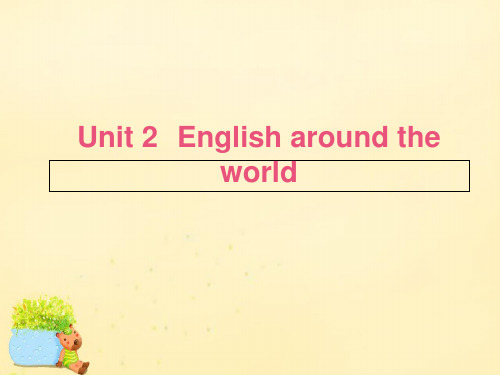
难句剖析
理解诱思
There are many kinds of English in the world;they are different in their vocabulary①,grammar,pronunciation and intonation②.These different kinds of English developed from history,geography,politics and the influence③ of other languages.Some of the major kinds of English are British English,American English,Canadian English,Australian English,Indian English and Caribbean English.The English spoken in Africa is different from country to country.Thus there is Nigerian English,South African English,Kenyan English and so on.
词海拾贝
难句剖析
理解诱思
乐、技术和贸易的影响。美国英语和英国英语最显著的不同是在拼写、发音和词汇方面。许多以-our结尾的英国英语的单词在美国英语中是以-or结尾。以-se结尾的英国英语的单词,它们的美国英语单词是以-ze结尾。有些词汇条款也不同,在表达方面也有许多不同。美国人总说“I just ate”,然而英国人说“I’ve just eaten”。在美国英语中说玛丽“on the team”,然而在英国英语则说玛丽“in the team”。
英语仁爱版九年级上册Unit3 English around the World随堂小练(含解析)

Unit 3 English Around the World 2. Some things usually have different meanings in different cultures.—英语仁爱版九年级全册随堂小练一、翻译句子1.在中国,牡丹代表富贵。
In China, the peony _____ _____ wealth and rank.2.同一个词,可能既有贬义也有褒义The same word may have both _____ _____ and _____ _____ as well. 3.作为一名中学生,你应该注意你的言行。
As a junior school student, you should _____ _____ _____ your words and behaviors.4.因为打破了玻璃窗,他在等着屋主回来。
真是一个诚实的孩子! He is waiting for the owner because he broke the window. _____________ boy he is!5.不论什么时候我读这本书,我就感到困。
__________________________________________________________二、单选题6.I ______ at 6 a.m. so I can leave for school at 7 a. m.A. get upB. put upC. take afterD. get on7.The United Nations ________ Chinese people as we are practical and take real actions in making climate change seen on a global level. Which of the following can NOT be filled in the blanketA.praisesB.speaks highly ofC.thinks highly ofD.makes great contributions for8.—Having a friend is much better than having a(n) ________. —That’s true. W e should try to get on well with others.A.enemyB.energyC.emperorD.child9.Nanjing Forest Music Festival is worth attending ________ it mixes traditional Chinese music and modern Western music.A.whileB.untilC.wheneverD.because10.Thanks to the team spirit, we got the ________ in the end and all of us will value this experience.A.courageB.knowledgeC.victoryD.pleasure答案以及解析一、翻译句子1.答案:stands for2.答案:negative meanings; positive meanings3.答案:pay attention to4.答案:What an honest5.答案:Whenever I read the book, I (will) feel sleepy.解析:根据句意可知是在描述客观事实,所以时态是一般现在时,whenever表示无论什么时候,引导让步状语从句,I表示我,是第一人称单数,谓语动词用原形,read表示读,是动词原形,this表示这本,后面加可数名词的单数,book表示书,是可数名词的单数,主句主语是I(表示我),是第一人称单数,谓语动词用原形,feel表示感到,是系动词原形,后面加形容词,sleepy表示困的,是形容词,句子的首字母要大写,答案是Whenever I read the book, I (will) feel sleepy.二、单选题6.答案:A解析:本题考查动词短语。
高一英语English-around-the-world课件

Answer the following questions.
1. How many countries are there where the majority of people speak English? 2. How is English used in HK?
3. What language should we use on the Internet so that we can communicate with people around the world?
Word usage: Vocabulary:
BrE either dance colour center check have got pub ring
AmE either dance color centre cheque have bar call
Am. English elevator fall First floor candy check apartment subway
1.People from the following countries EXCEPT____use English as their mother languages. A. New Zealand B.South Africa C. the Philippines D. the Republic of Ireland 2.The number of people who learn English either as a first or a second language or as a foreign language in the world is more than____million. A.375 B.750 C.1,570 D.2,250 3.Why is it becoming more and more important to have a good knowledge of English?Because____ A. It is spoken all over the world. B. It is spoken by some developed countries, such as Britain, America and so on. C. Many people learn it as a foreign language. D. It is important for our future life and work. 4.Which of the following is NOT true? A.English is so important that it is possible that we Chinese will learn it as a second language in the future. B.It is within only 50 years that English has developed intoU Nhomakorabeait 2
新人教版必修一 Unit 2 English around the world全单元[教案]
![新人教版必修一 Unit 2 English around the world全单元[教案]](https://img.taocdn.com/s3/m/fef82b3d580216fc700afd84.png)
Teaching planTeaching aims:1. Get the students to learn different reading skills.2. Get the students to learn about the English language.Teaching important points:1. Develop the students reading ability and let them learn to use some reading strategies such as skimming, scanning, and so on.2.Enable the students to learn about English language and know different kinds of English so as to communicate with people from different countries.Teaching difficult points:Develop the students’ readi ng ability.Teaching methods :Task-based teaching and learningUnit 2English around the world知识目标:本单元需要学习的重点单词为:include role international native elevator flat apartment rubber petrol gas modern culture AD actually present(adj. )rule(v. ) vocabulary usage identity government Singapore Malaysia rapidly phrase candy lorry command request retell polite boss standard Midwestern southern Spanish eastern southeastern northwestern recognize accent lightning direction ma’am subway block本单元需要学习的重点词组为:play a role in because of come up such as play a part(in) 本单元需要学习的重点句型为:1. World English comes from those countries, where English plays an important role as a first or second language, either because of foreign rule or because of its special role as an international language. (the Attributive Clause; either. . . or. . . )2. Native English speakers can understand each other even if they don’t speak the same kind of English. (even if. . . )3. It became less like German, and more like French because those who ruled England at that time spoke French. (those who. . . )4. Today the number of people learning English in China is increasing rapidly. (the number of+ n. 作主语时,谓语动词用单数形式)5. Believe it or not, there is no such a thing as standard English. (Believe it or not, . . . )6. The US is a large country in which many different dialects are spoken. (the Attributive Clause)7. In fact, an English dictionary like the kind you use today wasn’t made until the time of the Qing Dynasty. (the Attributive Clause; not. . . until. . . )8. These men spent nearly all of their lives trying to collect words for their dictionaries. (spend. . . in doing sth. )9. At the age of fourteen, he left his village school in Scotland and taught himself while working ina bank. (while doing. . . )10. We know that languages develop and change over time and that is why we have new dictionaries from time to time. (that is why. . . )本单元需要掌握的交际功能用语为:语言交际困难(Difficulties in language communication) Pardon?I beg your pardon?I don’t understand.Could you say that again please?Sorry, I can’t follow you.Could you repeat that, please?Could you speak more slowly, please?How do you spell it, please?本单元需要掌握的语法为:祈使句及其间接引语(the imperative sentence and its indirect speech)1. 要求或命令(demands or orders)“Open the door, ” told he.→He told/ordered me to open the door.2. 请求(requests)He said, “Please open the door. /Would you please open the door? ”→He asked me to open the door.能力目标:1. 能运用所学语言知识谈论有关“世界英语”方面的话题。
English_around_the_World-语法课件

中 国 英 语 教 师 网
(let 引导的句子改成that 引导的宾语从句)
2) He said: “How happy I am!” He said that he was very happy. 或 He said how happy he was.
(感叹句改成 that/what/how 引导的宾语从句)
一、陈述句
S---V---that--从句
祈使句直接引语变间接引语的结构(~sb to do sth): A told B (not) to do… He told the girl to do it at once.
A asked B (not) to do… Mrs. Hill asked Mary to sing at their party.
englisharoundtheworld语法课件初中英语语法课件语法填空课件初中英语语法ppt课件现代汉语语法课件英语语法名词课件aroundtheworldallaroundtheworldwholeworldaroundaroundtheworld歌词
直接引语与间接引语
(Direct Speech and Indirect Speech) 1.定义:A.直接引述别人的话,叫 “直接引语”。 B.用自己的话转述别人的话,叫 “间接引语”。
Mrs. Hill said, “ please sing at our party, Mary.” Mrs. Hill asked Mary to sing at their party. She said to me, “Don’t smoke in the classroom.” She told me not to smoke in the classroom. He said, “Let’s go fishing tomorrow.” He suggested going fishing the next day.
(完整版)English-around-the-world PPT课件

Students’ Analysis
Students of Senior 1
1
2
3
They have basic abilities of learning
They've learned in primary school
Teaching objectives Knowledge objectives Ability objectives Moral objectives
Knowledge Objectives
• 1.Understand the development of English language.
• 2.Train students to retell the text using some key words.
Attract students’ interest
Make students have a relax
mood
Skimming and scaning
One choice question for students to choose the mian
idea of the passage
Three choice questions for students to choose and have a rough idea of the
1:Teaching Materia
1
Status & Function
2
Teaching Objectives
3
Key Points and Difficulty
Status & Function
九年级 上册U3Englisharoundtheworld词汇精讲精练
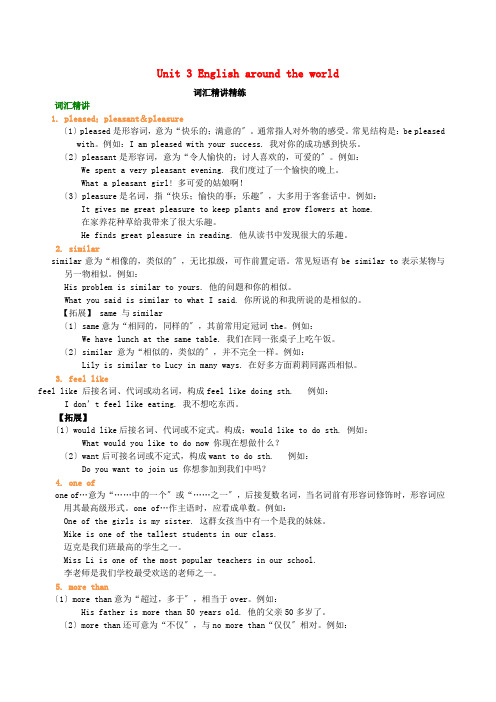
Unit 3 English around the world词汇精讲精练词汇精讲1. pleased;pleasant&pleasure〔1〕pleased是形容词,意为“快乐的;满意的〞。
通常指人对外物的感受。
常见结构是:be pleased with。
例如:I am pleased with your success. 我对你的成功感到快乐。
〔2〕pleasant是形容词,意为“令人愉快的;讨人喜欢的,可爱的〞。
例如: We spent a very pleasant evening. 我们度过了一个愉快的晚上。
What a pleasant girl! 多可爱的姑娘啊!〔3〕pleasure是名词,指“快乐;愉快的事;乐趣〞,大多用于客套话中。
例如: It gives me great pleasure to keep plants and grow flowers at home.在家养花种草给我带来了很大乐趣。
He finds great pleasure in reading. 他从读书中发现很大的乐趣。
2. similarsimilar意为“相像的,类似的〞,无比拟级,可作前置定语。
常见短语有be similar to表示某物与另一物相似。
例如:His problem is similar to yours. 他的问题和你的相似。
What you said is similar to what I said. 你所说的和我所说的是相似的。
【拓展】 same 与similar〔1〕same意为“相同的,同样的〞,其前常用定冠词the。
例如:We have lunch at the same table. 我们在同一张桌子上吃午饭。
〔2〕similar 意为“相似的,类似的〞,并不完全一样。
例如:Lily is similar to Lucy in many ways. 在好多方面莉莉同露西相似。
unit-2-English-around-the-world-(课文)
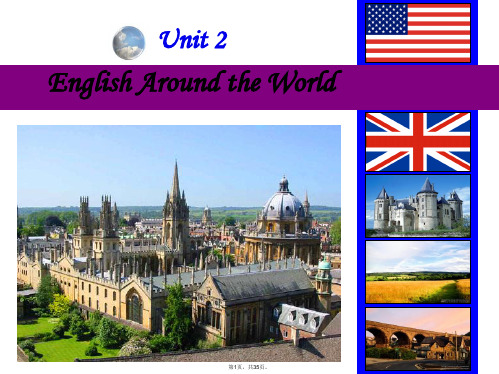
Summary of the reading :
English is a language spoken_ all over the world. but at first the English spoken in England between about AD450 and 1150 was very__d_if_fe_r_e_n_t_from the English spoken today. it was basedmore on German thanthe English we speak now, later English became lesslike German because new settlers enrich_e_d the English language and its vocabulary. So by the 1600s Shakespeare was able to make use of a wider vocabulary than ever before. finally by the 19th century the language was settled because dictionaries were written.
第22页,共35页。
Time
How is English developed?
Between about
Spoken in _En_g_la_n_d___ and based
A__D_45_0__ and 1_1_5_0__ more on G_e_r_m_a_n.
Between about A__D_8_00_and _11_5_0_
South Africa
第11页,共35页。
Unit2 English around the world (人教版新课标)解析版

“地毯式过单词”(人教版新课标)必修一Unit2 English around the world一、单词拼写(根据汉语或首字母提示写出单词的完全形式)1.I made friends with the (当地人),and they were concerned about me.【答案】natives【句意】我和当地人交朋友,他们都很关心我。
2.I paid a visit to Russia which is rich in natural resources and the travel(使丰富) my horizons.【答案】enriched【句意】我参观了资源丰富的俄罗斯,这次旅行丰富了我的视野。
st week some city o suggested the city might be interested in turning the old theater intoa museum and public meeting place.【答案】officials【句意】上周一些官员表态城市公众可能对把老剧院改造成博物馆和会议室感兴趣。
4.The ship will start its maiden (航行) next Monday,which makes me unable to keep calm.【答案】voyage【句意】下周一这艘船将开始它的第一次航行,这使我激动不已。
5.If you set down just one more new word each day,in the next year you will increase yourv by more than 300 words.【答案】vocabulary【句意】如果你每天记下一个单词,明年你就学会三百多个。
6.As you know,bamboo always stands s ,so it represents “noble”and “strong-willed”.【答案】straight【句意】正如你所了解的,竹子笔直代表着高贵与意志坚强。
English around theworld 阅读训练 +答案

阅读训练(二)高一外语组设计人:徐二军审核人:邢亚丽时间:2017.9.19AMany foreign students are interested in knowing what a typical (典型的) school day is like in an English primary school. Here is an introduction.At our school, school begins at 8:55 am. The duty teacher blows a whistle (哨子) and the children line up in their class groups. They wait quietly for the teacher to send them to their classrooms.The first lesson of the day begins at 9:30 am. Our morning lessons are usually English or mathematics. Each of these lessons lasts for an hour.The children have their morning break from 10:30 am to 10:45 am. Our children bring a snack from home to eat on the playgrounds. We now have an hour and fifteen minutes before lunch time. The first fifteen minutes may be spent giving the children their weekly spelling test. The children will then have an English or mathematics lesson before lunch time.Lunch time is from 12 noon to 1:10 pm. Most children bring their lunch from home. Some children will have a cooked school dinner. While the children are waiting to have their lunch or after they have finished eating, they play games on the playgrounds or attend lunch time clubs. We have Midday Supervisors (指导者) who look after the children during lunch time. Teachers are also on hand to help out and supervise. They take it in turns to be on duty during lunch time.After lunch time, lessons resume with reading activities. This could be the whole class quietly reading or the children do some reading in groups. The rest of the afternoon is spent learning one or two of our other school subjects.1.What is this passage mainly about?A.The food pupils usually have in an English primary school.B.The activities pupils in England do during the breaks.C.The main subjects pupils learn in an English school.D.A typical school day in an English primary school.2.We can know from the passage that ________.A.school usually begins at 9:30 amB.the first lesson ends at 10:30 amC.some lessons last longer than an hourD.there is no mathematics lesson in the morning3.We can learn from Paragraph 5 that ________.A.no teachers can be seen on the playgrounds during lunch timeB.lunch is usually not provided by the schoolC.children usually go out of the school after lunchD.the school provides a snack to every pupil daily4.What does the underlined word “resume” in the last paragraph mean?A.appear. B.change.C.continue. D.improve.BIf you want to become a fluent English speaker you should take some advice: There are four skills in learning English. They are reading, listening, speaking, and writing. The most important thing you must remember is that if you want to improve your speaking and writing skills you should first master the skills of reading and listening. Read as much as you can. But your reading must be active. It means that you must think about the meaning of the sentence, the meaning of the unfamiliar words, etc. There is no need for you to pay much attention to grammars or try to understand all the unfamiliar words you come across,but the fact that you see them for the first time and recognize them whenever you see them, for example, in other passages or books, is enough. It would be better to prepare yourself a notebook so you can write down the important words or sentences in it.As for listening, there are two choices: besides reading, you can listen every day for about 30 minutes. You can only pay attention to your reading and become skillful at your reading, then you can catch up on your listening. Since you have lots of inputs in your mind, you can easily guess what the speaker is going to say. This never means that you should not practise listening.For listening you can listen to cartoons or some movies that are specially made for children. Their languages are easy. Or if you are good at listening you can listen to VOA or BBC programs every day. Again the thing to remember is being active in listening and preferably taking some notes.If you follow these pieces of advice, your speaking and writing will improve automatically, and you can be sure that with a little effort they will become perfect.5.According to the author, which should you improve first among the four skills? A.Reading and listening. B.Reading and writing.C.Writing and speaking. D.Speaking and listening.6.The underlined phrase “come across” in the second paragraph can probably be replaced by “________”.A.meet by accident B.discoverC.find on purpose D.look for7.The author seems to agree with the view that ________.A.everyone should listen to VOA or BBC programs every dayB.you needn't practise listening if you keep on reading every dayC.being good at reading is helpful in improving your listeningD.you should take notes of whatever you are hearing8.The passage is mainly about how to________.A.choose suitable listening materialsB.deal with new words in readingC.improve your English as quickly as possibleD.become fluent in speaking and writing EnglishCI was in a strange city I didn't know at all, and what's more, I could not speak a word of thelanguage. On my second day I got on the first bus that passed, rode on it for several stops, then got off and walked on. The first two hours passed pleasantly enough, then I decided to turn back to my hotel for lunch. After walking about for some time, I decided I had better ask the way. The trouble was that the only word I knew of the language was the name of the street in which I lived, and even that I pronounced badly. I stopped to ask a newspaperseller. He handed me a paper. I shook my head and repeated the name of the street and he put the paper into my hands. I had to give him some money and went on my way. The next person I asked was a policeman. He listened to me carefully, nodded and gently took me by the arm. There was a strange look in his eyes as he pointed left and right and left again. I nodded politely and began walking in the direction he pointed.About an hour passed and I noticed that the houses were getting fewer and fewer and green fields were appearing on either side of me. I had come all the way into the countryside. The only thing left for me to do was find the nearest railway station.9.The writer preferred to walk back to his hotel because ______.A.he had no money to buy a ticketB.he wanted to lose himself in the cityC.he tried to know the city in this wayD.it was late and there were no buses passing by10.The newspaperseller________.A.didn't know where the hotel wasB.didn't understand what the writer saidC.could understand what the writer saidD.didn't want to take the money from the writer11.From the story we know that the policeman________.A.was kind but didn't understand the writerB.told the writer where to take a trainC.knew what the writer really meantD.was coldhearted and didn't help the writer12.What can we learn from the last paragraph?A.The writer got close to the hotel where he stayed.B.The writer got to the hotel with the policeman's help.C.The writer found he was much farther away from the hotel.D.The writer found the hotel in the direction the policeman pointed.13.In your opinion, what was the writer's real trouble?A.He didn't know the city at all.B.He couldn't speak the language.C.He went too far in the wrong bus.D.He followed the policeman's direction.DThe airline lost your baggage. The hotel laundry(洗衣房) ruined your favorite shirt. The taxi driver overcharged you. When you're abroad, sometimes things go wrong. Now you can do something about it! Use these tips when you want to express an effective complaint in English.No matter how unfair the situation, it's best to phrase your complaint politely. In English, you'll sound more polite if you use indirect language. Here are some examples:“I'm sorry to bother you...” Starting a complaint like this puts the listener who may have heard many complaints that day at ease. Use this phrase if the situation isn't that serious. For example, “I'm sorry to bother you, but I wanted a baked potato, not fries.”“Can you help me with this?” Everyone would much rather be asked to do something than told! So try phrasing your complaint as a request for help: “Can you help me wi th this? My shirt came back from the laundry without buttons.”“I'm afraid there may be a misunderstanding.” This is a polite way of saying, “Your information is wrong. Please fix it now.” You'll most likely use this phrase if you made reservations(预定) for a flight, hotel or restaurant, and when you arrive, it's not what you expected. For example, “I'm afraid there may be a misunderstanding. I requested a non-smoking room.”“I understand it's not your fault...” Often when you make a complaint, you deal with a person who was not directly responsible for the problem. But the problem isn't your fault, either! This phrase is helpful when you need swift action. T ell the person you're dealing with you understand they're not at fault and then directly state the pro blem: “I understand it's not your fault, but the airline promised they would deliver my baggage yesterday.”“Excuse me, but I understood that...” Using this phrase lets the person know you're well-informed and are suspicious they might be trying to take advantage of you. Don't say, “Hey! You're trying to cheat me!” Instead, start indirectly by stating what you know to be true: “I understood that the taxi ride to the airport was only 25 dollars.” Then give them an opportunity to do the right thing.14.According to the passage, if we meet an unfair situation, we'd better ________. A.state our complaints politelyB.go for the police immediatelyC.use indirect language to hurt peopleD.fight against the one who is responsible15.Why should we start a complaint with polite phrases?A.Because the situation is never serious.B.Because the listener may not speak English.C.Because it can help solve the problem more easily.D.Because we should be always in good manners abroad.16.Several effective complaints in English are mentioned above EXCEPT ________. A.“Can you help me with this?”B.“I understand it's not your fault.”C.“Hey! You're trying to cheat me!”D.“I'm afraid there may be a misunderstanding.”短文改错Today we had a chemistry test. I found the test difficulty, but I tried hardly to do it. Suddenly Mary, my best friend, asking me to let her to copy my answers. After think for some time, I let her to copy my answers. But after the test, all of us were called to the teacher…s office. The teacher was angry because we had same answers in the tests. We were warned not to cheat again so she would need to see our parents. I was very upset. I didn…t cheat. I was just helping a friend. Why does she punish me?A:DBBCB:AACDC:CBACBD:ACC短文改错1. dicciculty 改difficult2.hardly 改hard3.asking 改asked4.to copy 改to去掉5.think改thinking6.all改both7.same前加the8.tests改test9.so改or10.does改did。
《Languages Around The World》Listening and TalkingP

谢谢
11、越是没有本领的就越加自命不凡。——邓拓 12、越是无能的人,越喜欢挑剔别人的错儿。——爱尔兰 13、知人者智,自知者明。胜人者有力,自胜者强。——老子 14、意志坚强的人能把世界放在手中像泥块一样任意揉捏。——歌德 15、最具挑战性的挑战莫过于提升自我。——迈克尔·F·斯特利
《Languages Around The World》
Listening and Talking
11、用道德的示范来造就一个人,显然比用法律来约束他更有价值。—— 希腊
12、法律是无私的,对谁都一视同仁。在每件事上,她都不徇私情。—— 托马斯
13、公正的法律限ห้องสมุดไป่ตู้不了好的自由,因为好人不会去做法律不允许的事 情。——弗劳德
2013年高中英语 Unit2《EnglisharoundtheWorld》七选五阅读填空精品测试训
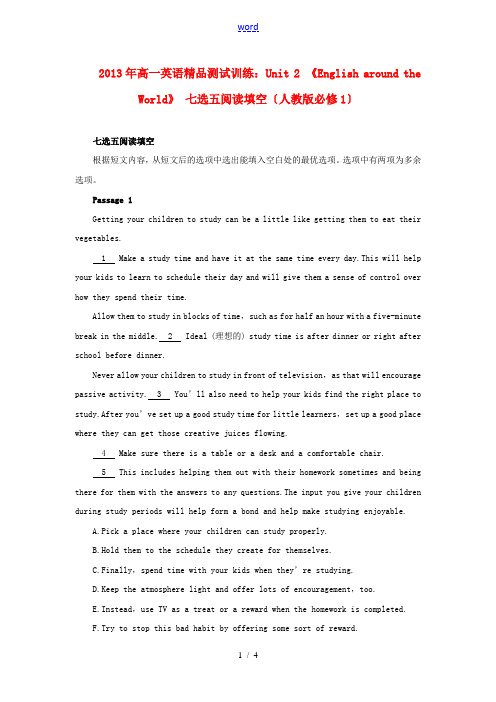
2013年高一英语精品测试训练:Unit 2 《English around the World》七选五阅读填空〔人教版必修1〕七选五阅读填空根据短文内容,从短文后的选项中选出能填入空白处的最优选项。
选项中有两项为多余选项。
Passage 1Getting your children to study can be a little like getting them to eat their vegetables.1 Make a study time and have it at the same time every day.This will help your kids to learn to schedule their day and will give them a sense of control over how they spend their time.Allow them to study in blocks of time,such as for half an hour with a five-minute break in the middle. 2 Ideal (理想的) study time is after dinner or right after school before dinner.Never allow your children to study in front of television,as that will encourage passive activity. 3 You’ll also need to help your kids find the right place to study.After you’ve set up a good study time for little learners,set up a good place where they can get those creative juices flowing.4 Make sure there is a table or a desk and a comfortable chair.5 This includes helping them out with their homework sometimes and being there for them with the answers to any questions.The input you give your children during study periods will help form a bond and help make studying enjoyable.A.Pick a place where your children can study properly.B.Hold them to the schedule they create for themselves.C.Finally,spend time with your kids when they’re studying.D.Keep the atmosphere light and offer lots of encouragement,too.E.Instead,use TV as a treat or a reward when the homework is completed.F.Try to stop this bad habit by offering some sort of reward.G.One of the best ways to form good study habits for your kids is to design a schedule that they keep to.答案:1~5 GBEACPassage 2The seven Cs of a good letterWhat is the secret of writing a good letter? You will be successful if you follow these seven Cs.Clear. 1 Make them easy to understand.Talk as if the reader were right there with you.Correct.Writing should be taken seriously. 2 Use your dictionary.If you need to,check a reference book e them as much as you need to.Complete plete your points.Finish one point completely before going on to the next.Courteous (礼貌的).Be friendly.Present your information nicely even if you are complaining about something. 3Concise.Make each point as clearly and briefly as you can.Conversational.This is really the secret of good writing, 4 Such a letter has a natural,friendly tone.Considerate. 5 Write about what you believe the reader needs or wants to know.Try to be helpful.This will build good feeling toward you.The seven Cs are about writing letters.But how about school papers? Use the seven Cs.Write as if you are talking to your teacher or professor.You’ll be surprised.You’ll almost instantly become a good writer.And you might even enjoy writing from now on.e short,direct sentences.B.Include long sentences in your letter.C.Think of the readers’ point of view as you write.D.Just “talk〞 to the person.E.In all letters,treat others as you want them to treat you.F.Don’t guess,even for spelling.G.Make sure what you say is correct.答案:1~5 AFEDCPassage 3Why Is Exercise Cool?1.Exercise Strengthens MusclesDid you ever do a push-up or swing across the monkey bars at the playground?1 By using your muscles to do powerful things,you can make them stronger.For older teens and adults,this kind of workout can make muscles bigger,too.2. 2Can you touch your toes easily without yelling ouch? Most kids are pretty flexible,which means that they can bend and stretch their bodies without much trouble.Being flexible is having “full range of motion〞,which means you can move your arms and legs freely without feeling tightness or pain.3.Exercise Keeps the Balance3 Your body needs a certain amount of calories every day just to function,breathe,walk around,and do all the basic stuff.4 If you’re not very active,your body won’t need as many calories.Whatever your calorie need is,if you eat enough to meet that need,your body weight will stay about the same.If you eat more calories than your body needs,it may be stored as extra fat.4.Exercise Makes You Feel GoodIt feels good to have a strong,flexible body that can do all the activities you enjoy—like running,jumping,and playing with your friends.It’s also fun to be good at something,like scoring a basket,hitting a home run,or perfecting a dive.But you may not know that exercising can actually put you in a better mood. 5 It’s just another reason why exercise is cool!A.So do you want to do any aerobic (有氧的) exercise right now?B.Food gives your body fuel in the form of calories,which are a kind of energy.C.When you exercise,your brain releases a chemical,which may make you feel happier.D.Those are exercises that can build strength.E.Exercise Makes You FlexibleF.Exercise Makes Your Heart HappyG.But if you’re active,your body needs an extra measure of calories or energy. 答案:1~5 DEBGC。
高一英语满分作文:10篇优秀范文必背(人教版)
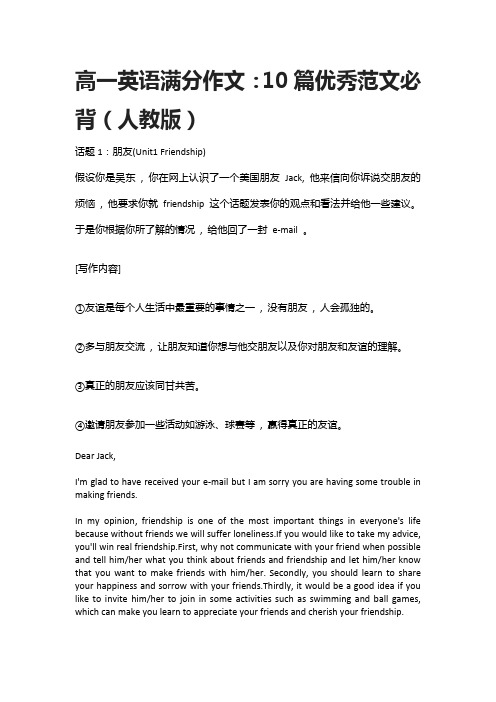
高一英语满分作文:10篇优秀范文必背(人教版)话题1:朋友(Unit1 Friendship)假设你是吴东, 你在网上认识了一个美国朋友Jack, 他来信向你诉说交朋友的烦恼, 他要求你就friendship 这个话题发表你的观点和看法并给他一些建议。
于是你根据你所了解的情况, 给他回了一封e-mail 。
[写作内容]①友谊是每个人生活中最重要的事情之一, 没有朋友, 人会孤独的。
②多与朋友交流, 让朋友知道你想与他交朋友以及你对朋友和友谊的理解。
③真正的朋友应该同甘共苦。
④邀请朋友参加一些活动如游泳、球赛等, 赢得真正的友谊。
Dear Jack,I'm glad to have received your e-mail but I am sorry you are having some trouble in making friends.In my opinion, friendship is one of the most important things in everyone's life because without friends we will suffer loneliness.If you would like to take my advice, you'll win real friendship.First, why not communicate with your friend when possible and tell him/her what you think about friends and friendship and let him/her know that you want to make friends with him/her. Secondly, you should learn to share your happiness and sorrow with your friends.Thirdly, it would be a good idea if you like to invite him/her to join in some activities such as swimming and ball games, which can make you learn to appreciate your friends and cherish your friendship.I hope you will find these opinions and ideas useful. Best wishes!Yours,Wu Dong话题2:英语(Unit2 English around the world)假设你是李华, 你所在学校拟在下周开一个" 如何高效地学习英语" 的讲座。
- 1、下载文档前请自行甄别文档内容的完整性,平台不提供额外的编辑、内容补充、找答案等附加服务。
- 2、"仅部分预览"的文档,不可在线预览部分如存在完整性等问题,可反馈申请退款(可完整预览的文档不适用该条件!)。
- 3、如文档侵犯您的权益,请联系客服反馈,我们会尽快为您处理(人工客服工作时间:9:00-18:30)。
Unit 2
English Around the World
Tsinghua Experimental School In Shenzhen
乔广发
Say this passage in your dialect.
“曾经有一份真诚的爱摆在我的 面前,但是我没有珍惜,等到了失去 的时候才后悔莫及,尘世间最痛苦的 事莫过于此。如果上天可以给我一个 机会再来一次的话,我会说‘我爱 你’。如果非要把这份爱加上一个期 限,我希望是一万年!”
Fast reading
1.How many people spoke English at the end of the 16th centrury?
About 5-7million people
2.When did Hongkong begin to use English ?
About 1842
】
AE
elevator
apartment candy eraser In a team truck
fall subway On the play ground
BE
lift
flat sweets rubber On a team lorry
autumn
undergroun In the play ground
one another Para.4
English is alsospoken as a foreign or second language in Africa and Asia.
Cloze test
At the end of the 16th century, about seven million people spoke English. Nearly all of them lived inE__n_g_la_n__d_. As people from England started _______tmo ovthinegr parts of the world ,English began to be ______spinokmenany other countries. Now more people speak English than ever_______.b_e_fo_r_e__EnNgaltiisvhespeakers can understand each other even _____thiefy don’t speak _____stahme e kind of English ._____, they mayHnowotebverable to understand everything. All languages change when _______communiccautletuwreitsh each other. Now American English and Australian English have their own_______. English isidalesnotity spoken in many other countries in Africa and______, such___A_ sia SouthaAsfrica, Indian, Singapore and Malaysia. Today the number of the people in China ____increasiinsg______. In fruatpuirdelyChinese English
True or False
1.It is possible that China has the largest number of English speakers Now.( T ) 2.Native English speakers can understand everything.( F ) 3.From1150—1500 sounded more like French.( T ) 4.Austrilian English is the same as British English.( F ) 5.Chinese English have become one of the world Englishes .( F )
COMPREHENSION
Read carefully and finish Part 1 in comprehending
Main idea
Read and find what each paragraph talks about.
Para. 1 The history of English spreading all over the world
Para. 2
Native language speakers can understand eacher other even if they don’t speakthe same kind of English.
Para. 3 All languages change when cultures communicate with
Guess words
_n_a_t_iv_e_E__n_g_li_s_h_s_p_e_a_k_er person who has spoken English since birth
_c_o_m_e__u_p_t_o_a__p_l_a_ce visit a place _a_ct_u_a_l_ly__ in fact _p_r_e_se_n_t__existing now _vo_c_a_b_u_l_a_r_y_all the words and phrases _u_sa_g_e___ the way of using sth identity who sb is ,what sth is _su_c_h__a_s like, for example _ra_p_i_d_ly_ fast
